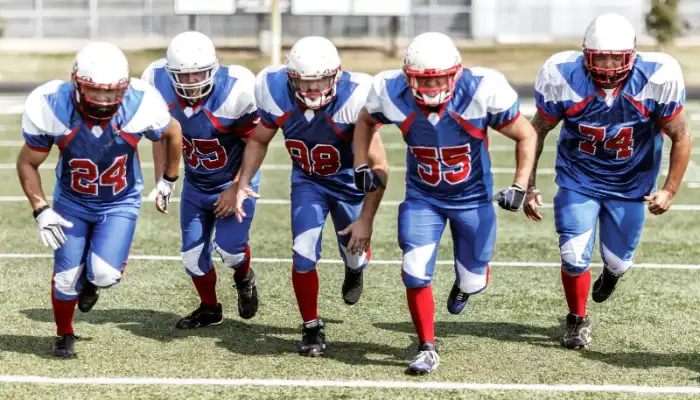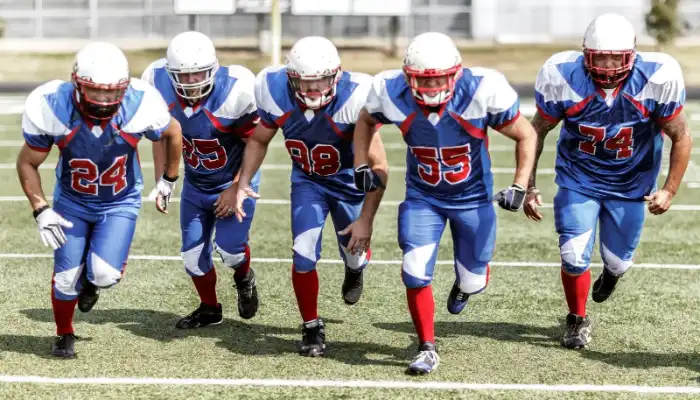
Bright lights in the stadium and noise from the crowd plus pre-game excitement are some of the minutes before a competition. At all levels, athletes encounter an adrenaline rush and anxiety that can be a stimulant to victory or frustration in defeat.
However, there is something champions use: chaos’ secret weapon; and pre-game rituals. Not just lucky charms but profoundly designed for psychological and physiological tuning.
So what are pre-game rituals? And why are they so important? Let’s delve into the science behind these habits as well as how you can build your own internal compass to navigate through your perfect performance journey.

The Power of Habit: How Rituals Shape Peak Performance
Pre-game rituals refer to repeated actions done by athletes before competing. They may include such simple acts like listening to favorite music or engaging in mental imagery about performing excellently in a match. In whatever form it happens though, there are numerous psychological and physical benefits tied to pre-competition routines:
Psychological Benefits:
- Routine and Consistency: Pre-game rituals provide structured routines for athletes within high-stress situations hence ensuring they feel more secure and centered thereby being able to put all their energy into the contest itself.
- Confidence Boost: Successful completion of one’s ritual before playing creates self-assuredness. This mindset makes people involved in games play positively.
- Anxiety Reduction: Anxiety prevails during pre-game time. Such rituals help athletes sublimate nervousness by channeling anxiety into an energizing routine. At least temporarily, sportsmen forget about their uncertainties when concentrating on particular steps concerning their future activities.
- Focus and Concentration Enhancement: Pre-game rituals switch on the athletes’ minds from being pre-gamed to competitive mode making them actively engage with other players mentally or physically on-field. By performing any of these activities, the players avoid distractions in their minds and concentrate on what they are supposed to do.
Physical Benefits:
- Warm-up Exercises: Most pre-game rituals incorporate gentle physical actions like stretching, dynamic drills, or light cardio. Blood circulation is increased through these warm-ups that allow muscles to be active hence increasing their overall range. Athletes are fit and have fewer injuries when they have warmed up well before performing.
- Injury Prevention: When athletes include dynamic stretches and little movements in their pregame routine, it helps them prepare for their competitions as well as minimize the risk of getting injured.
- Coordination and Agility Enhancement: Some rituals such as footwork drills or hand-eye coordination exercises can improve an athlete’s coordination and agility. These benefits manifest themselves directly in improved performance on the field or court.
Crafting Your Champion’s Ritual: A Guide to Personalization
Pre-game rituals are not universally applicable; they must be individualized. Here are tips to assist you in creating your own champion’s ritual:
- Identify Your Needs: What areas of your performance need attention? Do you get anxious before a game? Is it difficult for you to stay focused during matches? Tailor your rites according to your requirements.
- Experiment and Find What Works: Test different pre-game routines until you find the one that suits you best. This may also require blending several kinds of music, visualizations, or movements.
- Keep it Simple and Consistent: Although personalized, ensure your ritual is simple and continuous. A complicated routine with many processes may be too much when one is under crucial moments like those before a game.
- Practice Makes Perfect: Performing pre-game rituals is just like any other skill; it needs practice to work. Include this routine during practice sessions so that it becomes a part of your body’s memory.
Beyond the Game: The Lifelong Benefits of Rituals
However, rituals are not only powerful in the sports realm but also vital in daily life since they help individuals to develop focus and manage stressors resulting in improvement in quality of life at large. There are several ways through which rituals can improve our lives.
Morning Ritual
Do meditation or go through some inspiring materials every morning before breakfast.
Pre-Work Ritual
Just as in games, players focus better on matches or do their jobs more efficiently after doing a ‘’pre-work’’. This may involve hearing motivational talks, writing down tasks for the day, or making sure the office desk is tidy
Pre-Sleep Ritual
Before bedtime make sure there is an evening program that will help you relax. For instance, this might entail having an evening bath, sleeping with books under your pillow, or even performing yoga exercises once the lights are switched off.
Types of Pre-Game Rituals
Now let’s look at specific types of pre-game rituals:
Individual Rituals:
These are personal practices followed by athletes before competitions. The following list has some commonly observed ones:
- Visualization: Some people visualize themselves already playing competitive games well. This helps them gain motivation and stay focused on their objectives.
- Personal Mantras or Affirmations: Positive affirmations like “I am firm” or “I am concentrated” can help sportsmen to overcome self-doubt and remain highly motivated.
- Music or Playlist Selection: Athletes need lively music to be energized for game time. Conversely, slow songs also help players who have pre-match anxiety
Team Rituals:
The purpose of these rituals is to enhance the sense of unity among team members even in a tournament which makes them serve as bonding agents by pushing everyone to perform at their best:
- Group Huddles or Chants
Staying together gives each other motivation through chants within huddle formations
- Team Meals or Snacks
Having pregame meals together creates bonds between teammates and gives them regularity. These foods should ensure that one has an increased energy level while their concentration is enhanced too.
- Rituals Before Entering the Field or Court
There are several activities that teams undertake before walking into any gaming venue such as giving high fives to each other, group praying, and cheering all together.
Examples of Effective Pre-Game Rituals
Here are some examples of actual pre-game rituals used by successful athletes:
Rituals of Professional Athletes:
- Kobe Bryant’s Meticulous Pre-Game Ritual: Kobe Bryant, a basketball legend, was known to follow an extremely detailed pre-game routine. This constituted everything from specific music he listens to just before the match begins, stretching meticulously and finally making jump shots almost like a religion.
- Serena Williams’ Visualization Practice: Serena Williams is a tennis superstar who has been advocating for visualization techniques. She always imagines herself winning crucial points and whole matches even before she sets foot on the court.
- Michael Phelps’ Racer’s Playlist: Michael Phelps used to listen to a particular playlist before each race to get himself psyched up and concentrating.
Team Rituals in Sports
- Football Teams’ Pre-Game Locker Room Traditions: In many cases, teams have special traditions taking place in the locker rooms before they kick off their game. For example, it might mean being given an energizing speech by their coach or having some dances done in celebration
- Basketball Teams’ Pregame Handshakes: Pregame handshakes are common occurrences in basketball where teammates connect, strategize, and hype each other up before the game starts.
- Soccer Teams’ Group Visualizations: Soccer teams use collective visualization during their pregame rituals – these are moments when players imagine themselves saving certain goals or scoring some others.
How to Develop Personal Pre-Game Rituals
Despite this, however, what you observe from those above examples is that effective pre-game rituals are personal. Below are highlights on how you can go about coming up with your own:
- Self-Awareness And Acceptance Of Individual Needs: First things first try to understand your identity as an athlete. Are you too anxious prior? Can’t you think of success? Have your ritual address your issues directly if so.
- Experimentation and Adjustment: Do not be afraid of trying out different methods until you find the best combination that works for you. The secret is that it must enable you to be in the right mindset physically as well as mentally.
- Consistency and Commitment: When an athlete finds a pregame routine that makes sense to him, he should keep up with it at all times. By continuously practicing or repeating this ritual over and over again, the mind and body get used to it, hence making such a ritual very strong for better performance.
Tips for Implementing Pre-Game Rituals Successfully
Now you know why pre-game rituals are important and how they can help athletes. Below are some practical tips for making these sessions as effective as possible:
- Start Early and Stay Consistent Throughout the Season: Develop your pre-game routines way before competition pressure sets; introduce these into training sessions even before one’s first game. In this manner, the habit will have been cultivated through repeated practice leading to psychological benefits.
- Stay Flexible And Adjust To Unpredictable Conditions: On yet another occasion sticking to patterns is paramount though there could be unexpected issues forcing one to change their pre-game routine. It could be time running short or perhaps finding oneself in an unfamiliar dressing room. You must be prepared so that despite any adjustments or curtailments, this custom remains intact.
- Balancing Between Individual And Team Rituals: Some athletes prefer combining their routines with those of their teammates. For instance, team huddles, motivational speeches, or even group meals can improve comradeship among players thus improving focus toward the start of a match. It is important to remember that there should be a balance between what individual needs and what the whole squad needs since they have different desires for example after each match.
- Embodying Mental, Physical, and Emotional Selves: A good pre-game ritual has to address all aspects of an athlete’s well-being. This includes mental focus components (visualization, affirmations), physical readiness ingredients (light warm-up exercises), and emotional regulation features (deep breathing, positive self-talk).
Common Mistakes to Avoid
However, as much as pregame rituals are powerful tools, there are things that athletes must avoid.
- Overcomplicating Rituals: Keep your routine simple and manageable. A long list of steps may overburden you when you need support most in times of stress.
- Relying Too Heavily on Superstition: Some athletes introduce luck charms or superstitions in their rituals but do not rely too much on them. Concentrate on those that truly improve your performance.
- Skipping Rituals Under Time Constraints: If time is short include a shortened version of your pre-game ritual. In just two minutes concentrate on breath or listen to some music that pumps you up.
- Neglecting the Importance of Post-Game Routines: Just like in any game where reflection upon how it was done counts by every player; so does a post-game routine also play a similar role in this context? Reflect upon how you did it during the game, acknowledge any achievement made, and learn from what went wrong while playing. This will help one remain positive-minded and ready for future competitions.
Conclusion
The Pre-Game Ritual is not magical; it is a powerful tool that has been crafted by athletes to enhance their performance in games. This way, understanding the psychological and physical benefits of these rituals can assist one develop a personalized pre-game ritual that will act like a compass towards being an athlete’s champion in their peak performance. Always remember this fact since mental strength is a must-have for every successful athlete who says that the game starts before going to the field. Therefore, control your pre-game routine and see how confident you become and how much improved you are about your performance.
